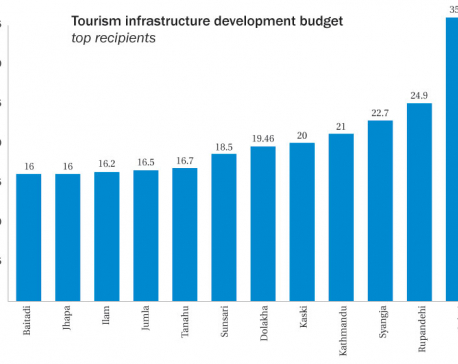
OR
Application of MTEF can make budget more realistic: Experts
Published On: June 7, 2017 12:20 AM NPT By: Rudra Pangeni | @rudrapang
KATHMANDU, June 7:Experts have underlined the need to adopt Middle-Term Evaluation Framework (MTEF) and follow practical approach of setting budgetary programs for improving public finance management.
Speaking at an interaction program on Public Expenditure and Financial Management in Kathmandu on Tuesday, Rajendra Bajracharya, national consultant for Public Finance Management (PFM), said the tendency of increasing budget allocation for programs on the basis of previous year's budget has become a major challenge in public expenditure management and financial accountability
The program was organized jointly by Society of Economic Journalists-Nepal (SEJON) and Secretariat of Public Expenditure and Financial Accountability (PEFA).
The government started budget planning as per Middle-Term Evaluation Framework (MTEF), an instrument applied to match development plans with available resources for next three fiscal years, in 2001. The budgetary plans and programs were updated accordingly following year, and some positive effects were visible thereafter, government officials recount. However, it was discontinued after 2006.
Prepared by the World Bank, MTEF is a globally applied instrument in managing public finance.
Bajracharya said it was unfortunate that the initiation of realistic budget planning and defining priority sectors for three years and allocating the budget for spending accordingly was discontinued.
Using MTEF also means planning the budget and programs in line with the periodic plans and continuing priorities rather than putting additional populist programs in budget.
However, every government over the past decade has shown interest to announce new programs and allocate budget for the same. But they were not much concerned about project preparation and planning to make effective budget allocation.
Murari Niraula, member secretary of PEFA, also stressed the need to adopt MTEF for making more realistic planning of income sources and expenditure plan. “Budget expenditure budget has nearly doubled compared to revenue sources. It is a challenging task to manage foreign and domestic burrowing to meet the budget deficit,” added Niraula.
Spokesperson for National Planning Commission, Tulsi Prasad Gautam, said that the apex policy making body of the government had started discussions last year with a plan to adopt MTEF. “But the plan could not move ahead,” he added.
There are various reasons behind poor spending of development budget over the past decade. Government officials admit that the lack of realistic budgeting and spending plan is one of the reasons behind low development spending.
Capital spending has remained below 80 percent of the allocation in average and most of the spending is concentrated toward the fiscal year-end, raising question on the quality of the work. Only 35 percent of the money allocated for capital expenditure has so been spent till Friday. This means the government has only six weeks to spend the remaining 65 percent.
A total of Rs 311 billion has been allocated for development works in the current fiscal year.
Political instability and indifference of ministries toward budget reforms were the key reasons behind failure to apply reforms measures like MTEF, added Gautam.
“Ministries are uninterested to implement the new instrument. They simply want to increase budget by 10 to 12 percent every year,” said Gautam, adding that they (ministries) do not want to project the amount that they can spend in current fiscal year as well as the next two fiscal year.
You May Like This

Too busy to apply make up? Here are a few quick make up tricks
For all you busy women out there who want a simple and less-complicated morning beauty routine, here are ways to... Read More...

Districts getting more tourists given less budget
KATHMANDU, July 12: Rasuwa district is one of the popular destinations for foreign tourists. Based on foreign tourist footfall, the... Read More...

Viber to make more investment in Nepal
KATHMANDU, June 23: Viber, one of the world's leading messaging apps with over 711 million unique users worldwide and 4.5... Read More...










Just In
- NRB introduces cautiously flexible measures to address ongoing slowdown in various economic sectors
- Forced Covid-19 cremations: is it too late for redemption?
- NRB to provide collateral-free loans to foreign employment seekers
- NEB to publish Grade 12 results next week
- Body handover begins; Relatives remain dissatisfied with insurance, compensation amount
- NC defers its plan to join Koshi govt
- NRB to review microfinance loan interest rate
- 134 dead in floods and landslides since onset of monsoon this year








Leave A Comment